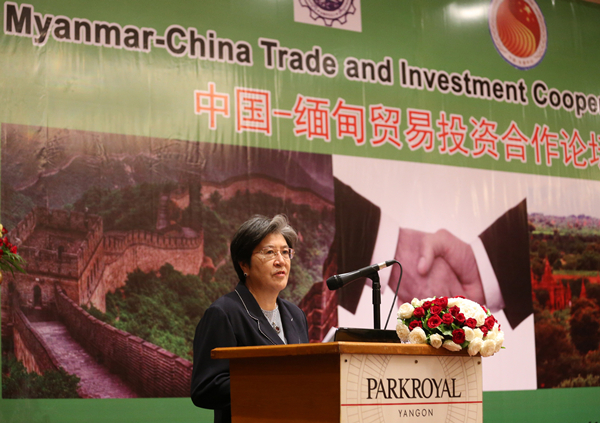On 22 October, 2015, the Myanmar-China Trade and Investment Cooperation Forum was held in Yangon, Myanmar. The Forum was co-organized by ASEAN-China Center (ACC) and Republic of the Union of Myanmar's Federation of Chambers of Commerce and Industry (UMFCCI), and supported by the Ministry of Commerce of Myanmar, Myanmar Embassy to China, and Chinese Embassy to Myanmar. ACC Secretary-General H.E, Mme. Yang Xiuping delivered the opening remarks. U Myo Thet, Vice President of UMFCCI, and officials from the Ministry of Commerce, the Ministry of National Planning and Economic Development of Myanmar, officials responsible for investment and trade policies of the Trade and Investment Committee of Myanmar, and more than 100 entrepreneurs from both China and Myanmar attended the Forum.

Secretary-General Yang said that China and Myanmar were friendly neighbors connected by mountains and waters, and had a long tradition of friendship. China and Myanmar had complemented each other in economy and conducted pragmatic cooperation. In 2014, bilateral trade volume reached 25 billion USD, a year-on-year growth of 145%. China had become the largest trade partner of Myanmar, and the bilateral trade volume accounted for 35% of the whole trade volume of Myanmar. China-Myanmar border trade volume accounted for 80% of Myanmar's whole border trade volume. By the end of July 2015, China's direct investment to Myanmar had accumulated to 3.9 billion USD, covering industries like power, mining, petroleum and gas. The accumulated contracted project value of China in Myanmar reached 18.5 billion USD, gaining a revenue of 12.2 billion USD. The projects included hydropower stations, airports, bridges and communication infrastructure, etc. Currently, China had been upgrading and improving its economic structure, and consumption had contributed to 60% of its economic growth. Consumption demands in information, culture, health and tourism had been growing, and energy consumption, environmental protection and green economic development were on their rise. China putting forward the "Belt and Road" initiative was to work hand-in-hand with the peoples from Asian countries and countries along the route, to pave way for the road of development and prosperity. In terms of production capacity cooperation, both sides should keep their own advantages and complement each other well. This would help Myanmar increase its production capacities, improve industry systems, facilitate industrialization, drive employment and economic growth, and realize a common development. She hoped the entrepreneurs from China and Myanmar could actively exchange ideas to create business opportunities and achieve mutual beneficial cooperation.

UMFCCI Vice President U Myo Thet extended a warm welcome to the delegates and pointed out that Myanmar had been a friendly neighbor of China which had enjoyed close relationship and lived peacefully with China. China is the major trade partner of Myanmar, and both countries had a long tradition in border trade and exchanges. The two countries were co-building the 21st Century Maritime Silk Road. Ports connecting the Kyaukpyu Island are under construction. Bangladesh-China-India-Myanmar economic cooperation, AIIB building and the China-Myanmar all-rounded strategic partnership were in progress. The two countries also signed MoUs in areas such as disaster relief, cultivation, petroleum, gas, communication and agricultural developments. In Yunnan Province, the China-Myanmar Ruili-Muse Cross-border Trade Cooperation Area had been set up. UMFCCI had been constantly making efforts so that enterprises of Myanmar could sign cooperation agreements with industrial and commercial associations in Chinese cities and provinces like Yunnan, Guangxi, Sichuan and Tianjin. The aim of such agreements was to ensure equality, justice, openness, security and environmental protection in the cooperation. Chinese financial organizations had received approval to set up branches in Myanmar, so that Chinese enterprises would enjoy better facilitation when they invest in Myanmar.
Officials from the Ministry of Commerce and Ministry of Trade and Investment introduced trade and investment policies of Myanmar and specified the preferential policies and relevant procedures. Mr. Li Yuan, Director of Trade and Investment Division (TID) of ACC, gave a specified introduction of the procedures, quota application, customs inspection and quarantine, and tax preferences involved when products, especially agricultural products, of Myanmar enter the Chinese market.

On the same day, Secretary-General Yang made an official visit to H.E. Mr. Hong Liang, Chinese Ambassador to Myanmar, and exchanged views on ASEAN-China relations. Secretary-General Yang also received interviews from Myanmar mainstream media such as Myanmar National TV Station and Skynet Television.
ASEAN-China entrepreneur delegation also visited Yangon Industrial Park, learned about the situation there and exchanged ideas with relevant officials of the Industrial Park. When the delegation was in Yangon, Mr. Jiang Yingang, Chinese Economic Counselor from the Chinese Embassy in Myanmar, introduced China-Myanmar cooperation situation to the delegation and gave suggestions on investing in Myanmar and risk prevention.